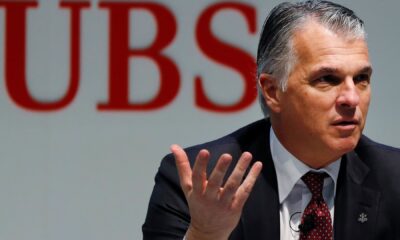Finance
Boeing is leaving and the CEO is already gone

Since reporting second quarter profit last week shares of Boeing (NYSE:BA) have lost $25 in value at the time of writing – a stock market drop of over 13%. However, that shouldn’t be a big surprise.
Boeing’s earnings were truly terrible. Bad enough to cost the CEO of Boeing his job.
Boeing in numbers
Boeing missed profits on a large scale last week. On the top line, revenue came in more than $300 million below expectations at $16.9 billion. Ultimately, the company reported a net loss of $2.33 per share. The company’s cash flow statement showed cash burn of $4.3 billion in one quarter.
To put these numbers in historical perspective, revenues fell 15% year over year, while losses increased 832%. Free cash flow – positive in the second quarter of last year – became negative. Cash burn, which was also negative in the first quarter, accelerated in the second quarter. So far this year, Boeing has burned a total of more than $8.2 billion, reducing its cash reserves to $12.6 billion against debt of $57.9 billion.
What’s going wrong at Boeing
Management blamed two factors primarily, citing “lower commercial supply volume and losses on fixed-price defense development programs.” Commercial aircraft deliveries in the quarter totaled just 92 units, down 32% from the second quarter of last year, resulting in a 32% drop in sales at (what used to be) Boeing’s largest company. In contrast, sales at the company’s defense, aerospace and security unit fell just 2%.
Operating losses at both companies soared: by 87% at commercial aircraft and by 73% at Boeing Defense, Space, and Security (BDS), with operating profit margins at both units continuing to deteriorate.
Only Boeing’s global services division showed any improvement last year, and even here it was minimal. Sales posted a 3% gain, operating margins rose just 2% and profit margins declined.
Help wanted: a new CEO for Boeing
Despite all the above evidence that all is not well at Boeing, CEO Dave Calhoun emphasized that the company is “making substantial progress in strengthening our quality management system and positioning our company for the future.” But he won’t be there to see them.
Just minutes after earnings results came out, Boeing announced that Calhoun would retire from Boeing after less than four years at the helm. The change was planned when Calhoun announced in October that he would step down once the company found a new CEO.
On August 8, former Rockwell Collins and RTX exec Robert K. “Kelly” Ortberg will take over as CEO and try to fix what Calhoun couldn’t.
He will have a lot of work to do.
What needs to be fixed at Boeing
As is now known, Boeing has several problems to solve, starting with chronic quality control problems in the commercial aircraft division (doors falling off planes and the like).
However, as management confirmed, the company is also facing an attempt by the Pentagon to shift more risk to its contractors by pushing for fixed-price deals on defense contracts. This shift has already cost Boeing billions of dollars in write-offs for things like the Air Force tanker contract, which Boeing won on a fixed-price bid, making Boeing nervous about entering into more such fixed-price deals in the future. The problem is, like Boeing refuses to sign fixed-price contracts, it may start to lose defense contracts to competitors that do shall draw them. That could cost Boeing not only revenue, but also profits in the future.
If you scan a little higher, you’ll also find issues with Boeing’s aerospace business (which is a small but not insignificant part of BDS). Specifically, a Starliner crew transport ship — the spacecraft Boeing depends on to fulfill its multi-billion-dollar commercial crew contract with NASA — is currently docked at the International Space Station, where it has been stranded for the past two months. More than two weeks after the sell-by date, Boeing and NASA are still considering whether it is safe to use Starliner to return the crew of two astronauts to Earth. If they ultimately decide that it is not is safe, NASA will likely have to use a SpaceX Crew Dragon to pick up the astronauts.
Such an ignominious end to Boeing’s ISS mission could potentially put the final nail in Starliner’s coffin and convince Boeing to abandon its manned spacecraft project entirely, resulting in billions of dollars in write-offs for BDS – and even more billions of dollars in losses for Boeing itself.
What it means for investors
As a $100 billion blue chip stock, you wouldn’t normally expect a company like Boeing to be a risky bet. However, the time when an investment in Boeing could be considered ‘safe’ is over. Boeing can’t even afford a dividend since 2020. And why not? According to data from S&P global market informationBoeing has not been profitable since 2018.
Boeing today is a turning point, pure and simple. And an investment in Boeing is essentially a bet that new CEO Kelly Ortberg can fix what his predecessors broke.
Should You Invest $1,000 in Boeing Now?
Consider the following before buying shares in Boeing:
The Motley Fool stock advisor The analyst team has just identified what they think is the 10 best stocks for investors to buy now… and Boeing wasn’t one of them. The ten stocks that made the cut could deliver monster returns in the coming years.
Think about when Nvidia created this list on April 15, 2005… if you had $1,000 invested at the time of our recommendation, you would have $641,864!*
Stock Advisor provides investors with an easy-to-follow blueprint for success, including portfolio building guidance, regular analyst updates, and two new stock picks per month. The Stock Advisor is on duty more than quadrupled the return of the S&P 500 since 2002*.
*Stock Advisor returns August 6, 2024
Rich Smith has no position in any of the stocks mentioned. The Motley Fool has no position in any of the stocks mentioned. The Motley Fool has one disclosure policy.
Boeing is leaving and the CEO is already gone was originally published by The Motley Fool













